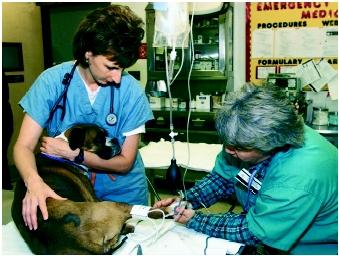Veterinarian
Becoming a veterinarian is a challenging yet rewarding process. A veterinarian is someone who has earned a Doctor of Veterinary Medicine (DVM) or a Veterinary Medical Doctor (VMD) degree from an accredited college or university. The veterinary program consists of four years of a combination of lecture classes, practical laboratory work, and clinical experience. Many veterinary programs allow students to choose an area of emphasis (usually small animals, equine, food animals, exotic animals, or mixed), although this varies among programs. While an undergraduate degree is not required to enter a veterinary program, the great majority of veterinary students have a degree, usually a Bachelor of Science in a biological science, and many may also have a Master of Science degree. Every veterinary program's entry requirements are different, but most include undergraduate courses in biology, chemistry, physics, mathematics, biochemistry, animal science, and animal nutrition. The high school student interested in pursuing a veterinary degree would be wise to take as many science and math courses as possible. Experience in handling animals is also a necessity for admission to a veterinary program, whether in a paid position or on a volunteer

The great majority of veterinarians are employed in private practice, but this is not the only employment opportunity. Veterinarians are needed in government to serve on medical and agricultural committees, to inspect meat and meat products, and to work in laboratories. Colleges and universities hire veterinarians to teach undergraduate and graduate courses and to conduct research. Overseas veterinary mission and Peace Corps work is available. Large research and pharmaceutical companies often have veterinarians on their staffs. A veterinary degree is extremely versatile and useful, particularly when combined with an undergraduate degree in a biological science.
Amy L. Massengill
Bibliography
Hurwitz, Jane. Choosing a Career in Animal Care. New York: The Rosen Publishing Group, Inc., 1999.
Comment about this article, ask questions, or add new information about this topic: